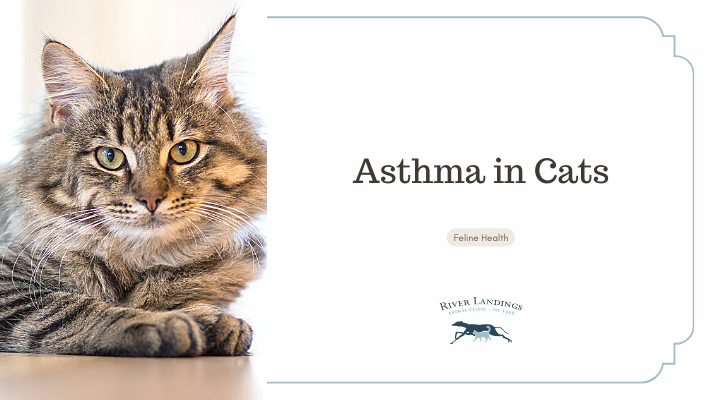What is Asthma and what is it like for Cats to have asthma?
You may be wondering how you will know if your cat suffers from asthma. Coughing and wheezing are usually the first signs that your cat is having an asthma attack. Another common symptom is your cat hunching close to the ground with its neck extended forward as if trying to expel a hairball.
If your cat is having a full-fledged asthma attack, you will most likely notice your cat's sides going in and out as they work hard to breathe, and your cat may be drooling or coughing up mucus. Needless to say, all of this can make your cat extremely nervous.
If you notice that your cat is having difficulties breathing, contact your vet immediately for assistance or call your nearest animal emergency hospital for assistance.
Signs & Symptoms of Feline Asthma / Asthma in Cats
Some other signs that your cat may be having an asthma attack include:
Rapid breathing
Difficulty breathing, or increased effort to breathe
Open-mouth breathing
Wheezing
Blue lips and gums
Persistent coughing or gagging
Overall weakness
Body hunched close to the ground with neck extended forward
Frothy mucus while coughing
Gurgling sounds from the throat
Increased swallowing
Asthmatic cats may also breathe rapidly while sleeping. Your cat should normally take between 24 and 30 breaths per minute while at rest or sleeping. If you notice your cat taking more than 40 breaths per minute, contact your veterinarian or your local animal emergency hospital.
It is important to note, however, that snoring or breathing loudly while resting does not always indicate that your cat is suffering from asthma. Nonetheless, if you are concerned about your cat's breathing, you should always consult with your veterinarian.
Causes of Asthma in Cats
You may be wondering—What causes an asthma attack in cats? Asthma is most commonly caused by the cat inhaling an allergen, but it can also be caused by increased stress. Among the allergens that can cause asthma attacks in cats are:
Dust mites
Grass
Cigarette smoke
Mould
Pollen
Some foods
Cat litter dust
Household cleaning products
Pet parents should also be aware that underlying conditions such as a genetic predisposition, a pre-existing heart condition, pneumonia, obesity, or even parasites can all contribute to the severity of a cat's asthma attack.
Asthma Treatment for Cats
Is there something I can give my cat for their asthma? What is in asthma medicine for cats? Once your vet diagnoses your cat with asthma, treatment may include corticosteroid medications to reduce inflammation in your cat's lungs, and possibly a bronchodilator to help dilate your cat's airways and allow them to breathe easier. Both of these drugs can be prescribed by your vet in the form of an injectable, oral medication, or inhaler. Depending on the overall health of your cat, the vet may prescribe a corticosteroid medication alone as a treatment for your cat's asthma, however, bronchodilators are not typically used on their own since they do not treat the inflammation that causes the asthma attacks.
The Prognosis for Cats with Asthma
What is the life expectancy of an asthmatic cat? Asthma in cats is an incurable and often progressive condition, which means that if your cat has asthma, he or she will likely have periodic flare-ups that range in severity from mild to life-threatening.
Having said that, asthma in cats is manageable with a little extra care from pet parents and appropriate medications. You can help your asthmatic cat live happily for years by monitoring his or her respiratory effort, keeping an eye out for coughing, and intervening with medication as needed.
What to Feed Cats with Asthma
What should you feed your asthmatic cat? Consult your veterinarian if you believe the food you are currently feeding your cat is causing or exacerbating your cat's asthma symptoms. Because obesity increases your cat's risk of having an asthma attack, feeding your cat a high-quality, vet-recommended food and assisting your cat in maintaining a healthy weight may help to reduce your cat's asthma symptoms or the severity of their asthma attacks. Your veterinarian will be able to recommend the best diet for your pet and even calculate the number of calories you should feed your cat each day.
Hear From Us Again
Don't forget to subscribe to our email newsletter for more recipes, articles, and clinic updates delivered straight to your e-mail inbox.
Related Categories:


